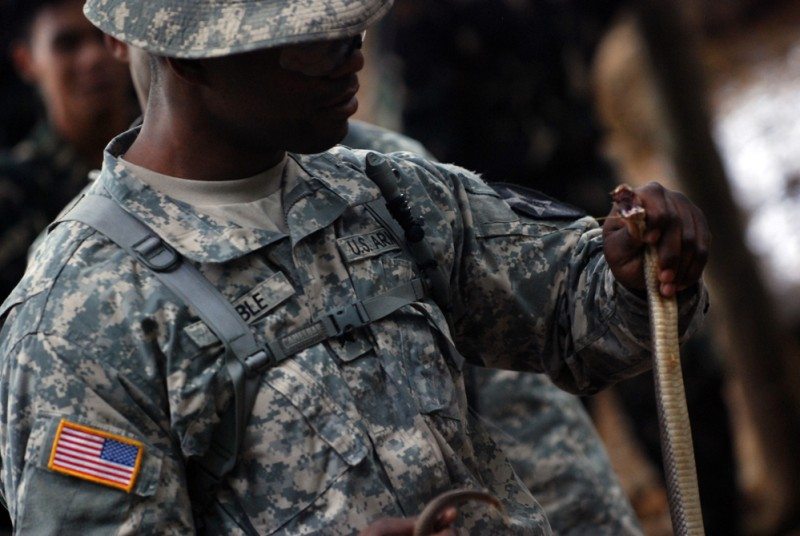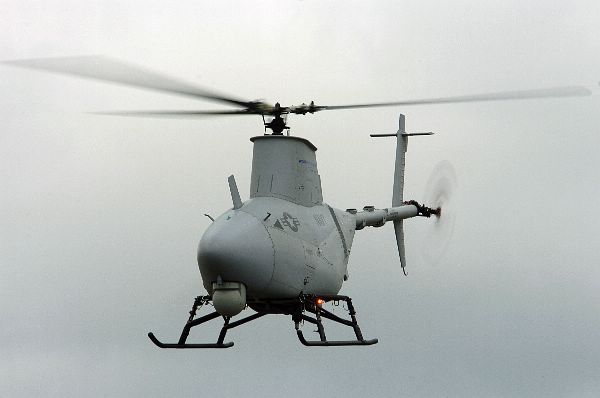Everyone wanted a taste. As the makeshift cup made its way down the line — continuously removed from the previous hand by the next excited participant — it wasn’t long before all the liquid was consumed. The blood had run out. Drinking cobra blood it turns out is not only one way of surviving in the jungle, but it is quite popular.
U.S. Soldiers and Marines conducted jungle survival training April 6, as part of Balikatan 2011 in the Philippines, an annual joint exercise between the armed forces of the United States and the Republic of the Philippines. The survival training, led by Filipino Special Forces instructor Staff Sgt. Romeo A. Soriano, was conducted jointly with Filipino army and marine servicemembers and held at the Filipino Special Forces School.
Servicemembers from both nations learned some of the basics of jungle survival, beginning with a walk through of different traps they could use in the field to catch various wildlife for sustenance. From there, it was time for fire building using dry bamboo bark. After a short demonstration, Soldiers and Marines were hard at work building multiple fires less than an hour into training.
“This is good hands-on training,” said Sgt. Andrew M. Gamble, 4th Squadron, 7th Cavalry Regiment, 2nd Infantry Division, based at Camp Hovey, South Korea.
Marine 1st Lt. Zachary Cook, Combat Assault Battalion, 3rd Marine Division from Okinawa, Japan, agreed.
“We started a fire from nothing,” said Cook. “They taught us the proper way to cut the bamboo and turn it into a proper flame.”
Once the fires were burning bright, the instructors provided the troops with vegetables for cooking, including corn and sweet potatoes. This served as a light breakfast, since no one was allowed to bring any food for the training. But before they knew it, troops were hot on the trail of their main course.
“Catch them,” said Soriano, as he pointed at a group of chickens. All at once, troops from both nations rushed at the chickens. Minutes later, with guidance from the instructors, they were preparing to cook their first real meal of the day.
Chickens were still cooking as the instructors demonstrated how to gut and prepare fish for cooking, and how to use hollow bamboo to cook rice.
Throughout the whole training, the troops’ excitement did not diminish, even with the high heat and humidity. To the contrary, their excitement seemed to grow as the day went on.
Balikatan, which means “shoulder-to-shoulder” in Tagalog, the official language of the Philippines, was the mood of the American servicemembers during the day as they trained alongside their Filipino counterparts.
“I loved it,” said Cook. “The things they taught us are very valuable. We’re learning a lot about jungle survival; the way to live off the land, and use the resources around us to survive the situation.”
But the best was still to come for some of the Marines.
“I’m looking forward to the cobra,” said Lance Cpl. Michael D. Plantz, with the 3rd Marine Division.
It wasn’t long before Soriano showed up with a small wooden box. No words were needed as everyone stared at the box. The hissing from inside quieted the troops with the efficiency of a hard-nosed sergeant major.
Everyone watched as Soriano pulled out one of the cobras and laid it on the ground. The four-foot-long serpent hissed angrily at him. Slowly, he approached the cobra from the side, then used a long wooden stick to pin the cobra’s head to the ground. He picked the serpent up by its head and asked for a volunteer to hold the snake. Almost immediately, there was a sea of raised hands.
Sgt. Ronnie E. Allen, Delta Company, 302nd Brigade Support Battalion, 4-7th Cavalry, was one of the many to raise his hand. Soriano reminded him to focus on the task at hand because, “Once you relax and not respect it, the cobra will strike.”
After learning how to properly hold it, Allen held the serpent as Soriano placed a small rope around its mouth. From there, instructor took the cobra and demonstrated how to prepare it for consumption. Emphasizing the importance of not wasting anything when surviving in the wild, the instructor showed the troops how to drain the blood from the serpent into a cup. He then offered everyone a sip.
For the next cobra, it was Allen’s turn to prepare the serpent for consumption.
“I felt good,” said Allen. “It was another good experience I never thought I’d get to do.”
As the cobra meat cooked, it was on to the next class.
Soriano showed everyone edible plants in the jungle, and discussed which plants help with healing wounds, removing ringworms, treating constipation and lowering blood pressure. Soriano also showed troops how to identify edible fruits and leaves.
Once the botany class was complete, it was time to dive into barbecued cobra meat. The bony body texture did not scare off the hungry Soldiers and Marines. It wasn’t long before every piece of the flavorful meat was gone.
“We were excited about coming out here,” said Allen. “(Survival training) is an integral part of being a Soldier. It’s a great course to be a part of.”
Gamble emphasized the importance of military leaders learning survival skills like the ones he learned here.
“I have a better understanding of what to do to survive, and I can take care of my Soldiers. (As a noncommissioned officer), taking care of Soldiers is what we do,” Gamble said.
After the meal, the instructors led the troops on a four-mile trek through the jungle, identifying edible vegetation and common dangers such as fire ants and poisonous plants along the way. During a rest halt, troops were able to rehydrate by drinking water from tree vines and bamboo.
Following the training and before the troops returned to their barracks, Soriano had one final word for his pupils.
“I taught you about traps, catching a cobra, and cooking without utensils. So many different Soldiers come to this school. I have been here for six years, this is my place. Come back anytime for more, you are always welcome here,” he said.











